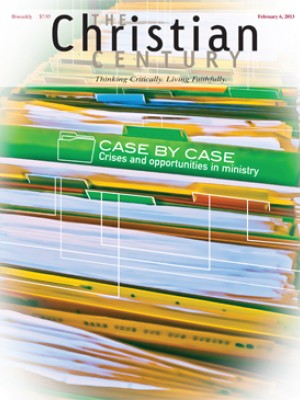Ash Wednesday: Isaiah 58:1-12; 2 Corinthians 5:20b-6:10; Matthew 6:1-6, 16-21
Isaiah gives voice to God. God is amazed at our epistemic closure.
Why do we humans so love to fake goodness? Year after year Lent brings another shout-out to the soul. Year after year we find ourselves dragged forward against the grain of our pretensions of religiosity, through the vulnerability of hearts tender with shames and fears, so that God may find us and make of us transmitters of a light other than our own.
After the November 2012 election there was considerable amazement in the press at how completely the losing party’s leadership had been fooled into believing its own alternative reality. The other side was able to say, “Told you so!” The phrase “epistemic closure” was bandied about—meaning locked into a self-flattering bubble instead of rubbing up against reality.
Read our latest issue or browse back issues.
Yet what is harder than to be self-critical when it comes to our own sacred goodness—to be critical of what gives us belonging, holds those like us together, allows us to think we are innocent, on the right side? The prophet Isaiah gives voice to God, who is amazed at our “epistemic closure.” He is not denouncing people who are doing things that they know to be bad. He is astounded at how those who are doing good things cannot see that their own goodness is a cover-up job. Our conviction of pleasing God is being ridiculed. What we call holy, God calls kitsch. The prophet points the way out of a delusion. There’s nothing passive about this pathway to a broken heart: it involves actively loosening patterns of desire that contribute to our cover-up. It involves actively reaching out to and giving cover to real people—the precarious, the poor, the outsider—in short, to all those whom our cover-up goodness has left uncovered.
There is no way of doing that without finding that my apparent good was not good—and that what I called “their just deserts” was in fact “the results of our cruelty.” It is only when my heart is broken and I draw close to those in our society who bear the yoke of my goodness, to those who are condemned by my finger-pointing—it is only then that the light of the Lord will break out. There is more than this: to break out of our self-flattering bubble and into proximity with the precarious is to break into reality. If we stick with this reforming of our desires, we will find ourselves on the inside of bringing into being what really is and what lasts.
St. Paul is onto exactly the same thing: the righteousness of God, or what real goodness looks like, is that victim in our midst who is considered to have been justly punished and condemned. God’s goodness looks like a seditious and blasphemous criminal in the eyes of what we normally call good. Paul longs for us to be reconciled with this outcast—and extend that sort of goodness to others. Paul is aware of how scandalous this can be. So he is very keen that those who follow in the way of the goodness that might scandalize don’t cast up unnecessary obstacles and roadblocks, thus making it even more difficult for the incredulous to receive God’s apparently scandalous goodness.
Yet he knows full well that to walk in this way is to become a sort of sacred monster—someone to whom are attributed all sorts of evil, and yet of whom none of these things is true. This is what it is to walk in the victimary space of Christ without the need for a cover-up of goodness, and to do so singing along the way. With Isaiah we break out in light, and with Paul we break out in song as we find ourselves on the inside of everything.
Exactly the same insight is given us by our Lord in our passage from Matthew, but with an even greater refinement in understanding our psychology. Our Lord understands that we are tremendously needy creatures, and what we long for more than anything else is approval and prestige. So completely are we governed by the desire of others that we risk selling out to them completely, acting out of regard for those who seem to hold the magic keys of “goodness.” “If I act in a way that they approve of, then I’ll get their seal of approval, and I’ll be an insider, one of ‘us,’ and not a dreaded one of ‘them.’”
The problem is that I’ll get what I want: their approval. And this will satisfy me! Which means that I will have sold myself short—and will be addicted to dancing like a puppet to their tune so as to hold on to my reputation.
So our Lord completely relativizes the three public cultural functions which we call “religion”: almsgiving, prayer and fasting. None of these public forms of goodness are bad, but neither are they worth anything in themselves. We desperately need approval, and he doesn’t chide us for that. Instead he urges us to step out of the regard of our social markers and into the regard of our Father who sees in secret. Thus we may come alive to and be drawn along by a pattern of desire in which we receive an approval far richer, deeper and more long-lasting than anything that peer-constructed notions of goodness can offer us. Only then will our public acting-out of goodness be undistorted.
Idol worship is not something that looks evil. Under different guises in every culture, especially our own, it passes as good and sacred and holy. Lent is a call to leave idols, to get past fake goodness and discover our heart in the heart of God.





